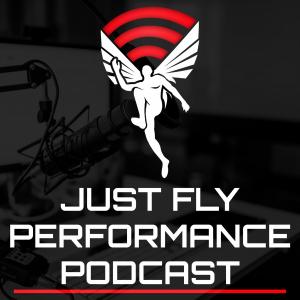Just Fly Performance Podcast

Randy Huntington on Training Cycles, Water Work, and a “Recovery First” Mindset in Speed and Power Training
Today’s show welcomes back Randy Huntington for a “part 2” of the recent episode #282 , speaking on the success of Chinese sprinter, Su Bingtian, and the third podcast with Randy in total. Randy is a track and field coach who has spent his recent years as the national track and field coach for the Chinese athletics association and has over 45 years of coaching experience. Huntington is rated as a USATF Master Coach in the jumps, has been the coach for many world-class athletes over the years, including eight Olympians and seven World Championship Team members. Mike Powell and Willie Banks set world records in the long jump and triple jump, respectively, while under his tutelage. In the last podcast, Randy spoke on several elements of the training methods that helped Su Bingtian to become the fastest accelerator of all time, such as sled and resisted sprint training, special strength work, and more. There was still a lot left to cover after the last episode, so for this show, we will dive back in (literally, in regards to the water training) to Randy’s training methodology. For today’s episode, Randy speaks in depth on Su Bingtian’s weekly training setup, and how he spaces out the weekly work, with a focus on rest and recovery. He will get into the topic of training density, and how this can be modulated with training cycles of various lengths (as opposed to only sticking with a traditional 7-day cycle). Randy will get into elements of water training, tempo sprint training, his version of over-speed work, and much more. This is an awesome compliment to the popular “part 1” of my recent chatting with Randy, and great material for coaches in any discipline. Today’s episode is brought to you by SimpliFaster, Inside Tracker, and Lost Empire Herbs. For 25% off of an Inside Tracker order go to info.insidetracker.com/justflysports For 15% off your Lost Empire Herbs order, head to lostempireherbs.com/justfly. View more podcast episodes at the podcast homepage. Timestamps and Main Points 4:39 – Details on Su’s weekly training setup, and how “work + rest = adaptation” 11:17 – Thoughts on how much, and how often to apply tempo work to team training 15:35 – How various cultures can have an impact on the type of training that athletes in that culture will optimally respond to 18:56 – The importance of water training for recovery, and recovery training in general, in Randy’s program 36:51 – Why the biggest need in coaching is on the level of youth coaches, and not those who work with elite athletes 42:06 – How Randy isolates the specific focus of his training sessions, not doing too much work all in one session 46:06 – Individual factors in elastic vs. muscular athletes in the construction of a training program 51:51 – The power of being able to move athletes around selectively amongst training groups in individual sports 55:21 – How Randy looks at long term training and seasonal shifts in training emphasis 59:51 – Principles on going beyond a typical 7-day weekly training cycle, into 9 and 10 day cycles. 1:04:51 – How Randy utilizes the “bigger players” in a training year (such as intense training methods, heavy lifting, intense plyos, etc.) and how he measures and manages recovery 1:12:06 – How Randy applies overspeed training with his athletes “I look at work, but I put the rest in first in the week, and then I follow it back up with what work we are going to do prior to the rest” “I like using pulse (for tempo training), I’d rather use SMO2 (when I can)… that gives me a very accurate appraisal of when to go again” “I make our strength coaches run (tempo) with the sprinters” “In China, you can’t give them a lot of time off, they fall apart very quickly if they have a lot of time off (Koreans were like the too)” “How do you increase density without (going to steroids)… that’s how I arrived at (water training)… my whole approach has been recove...






 Visit Podcast Website
Visit Podcast Website RSS Podcast Feed
RSS Podcast Feed Subscribe
Subscribe
 Add to MyCast
Add to MyCast